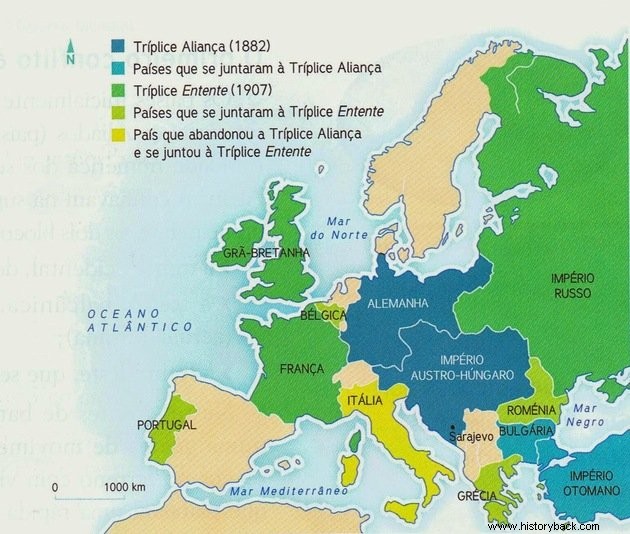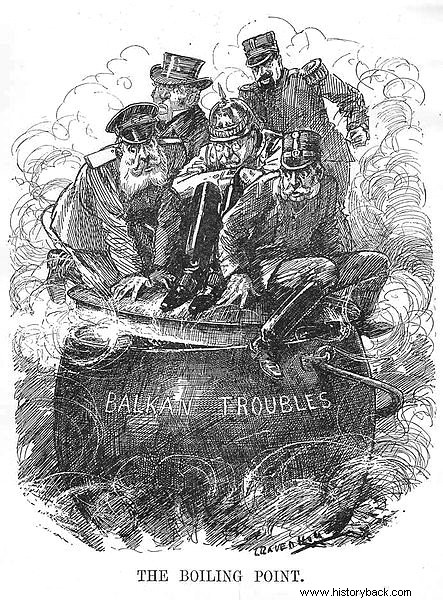The World War I began on July 28, 1914 and lasted until November 11, 1918, with the German surrender.
The trigger was the assassination of the heir to the throne of the Austro-Hungarian Empire that dragged the nations into the war on account of friendship and defense treaties.
Background
Since the end of the 19th century, Europe has lived in a climate of insecurity. For this reason, a system of alliances and agreements was created that divided the continent into two blocks, in order to guarantee protection and mutual military support in case of war:
- Triple Alliance - German Empire, Austro-Hungarian Empire and Italy
- Triple Entente - France, United Kingdom and Russian Empire

Determining Factors of the First World War
- Death of heir to the Austrian throne Francisco Ferdinand and his wife, on June 28, 1914;
- Progress of Capitalism and consequent social problems of the urban proletariat and the working poor in general;
- The imperialism and colonialism generated by the extraordinary industrial growth that intensified the clashes of economic and political interests between the industrialized powers;
- German expansionism and the transformation of Germany into the greatest industrial power in Europe, gave rise to a rivalry against him in France, England and Russia;
- French anti-Germanism , as a result of the Franco-Prussian War (1870-1871), in which France was defeated and forced to hand over to the Germans the regions of Alsace and Lorraine, the latter rich in iron ore;
- Russian-German rivalry , caused by the German intention to build a railway linking Berlin to Baghdad. Russia reacted, as the road would link Germany to the Middle East, rich in oil and with an attractive consumer market, as well as passing through regions where the Russians intended to increase their influence;
- English anti-Germanism , the result of German industrial competition. On the eve of the war, German and English products competed in markets that until then had been exclusively dominated by England. When German products began to penetrate England itself, the English industrial and financial bourgeoisie began to feed the idea that Germany should be contained.
Historical Context
In the decade before World War I, the Balkan Peninsula was in perpetual conflict.
The Austro-Hungarian Empire, made up of people of different nationalities, felt threatened by the nationalist manifestations of its ethnic minorities, mainly Czechs and South Slavs.
The Serbs intended to form Greater Serbia, which would encompass Bosnia and Herzegovina, and all Slavic peoples living in regions dominated by Austria. For the Austro-Hungarians, Serbia was a threat and should be eliminated.
Another major threat to the Austro-Hungarian Empire was the Russian Empire. This Slavic nation, which defended the idea that they had the mission to free the Slavs from the domination of the Turks and the Austrians.

In turn, Russia had treaties of friendship and defense with Serbia, which guaranteed the intervention of the Empire in case it was attacked. With this agreement, Russia also intended to impose trade monopolies in the region.
In 1908, Austria annexed Bosnia and Herzegovina, frustrating Serbia's pretensions. The region enters successive internal wars and from there the steps towards the world war that will be known from 1914 were accelerated.
With the assassination of the heir to the Austrian throne and his wife, the Austro-Hungarian Empire gives an ultimatum to Serbia. The Empire demands to participate in the court that would try the culprit, student Gavrilo Princip.
Serbia does not accept this condition and the Austro-Hungarian Empire declares war on the country, turning the complex machinery of agreements and treaties of European nations. Within a year, the European colonies would also be involved in the conflict.
Thus, we see that the death of Archduke Franz Ferdinand and his wife Sofia, was a pretext for the outbreak of a conflict that could be limited to both nations.
However, it involved the great imperialist powers and their allies, between 1914 and 1918.
Vestibular Questions
1 . (Unesp) The First World War (1914-1918) resulted from a change in the institutional order prevailing over a long period of the 19th century. Among the reasons for this change, the following stand out:
a) the division of the world into two ideologically antagonistic blocs and the constitution of industrialized countries in America.b) the destabilization of European society with the emergence of socialism and the constitution of fascist governments in European countries.c) the economic dominance of the markets of the European continent by England and the siege of Russia by capitalism.d) France's opposition to the division of its territory after the Napoleonic wars and the rapprochement between England and Germany.e) the unification of Germany and the conflicts between the powers raised for the annexation of colonial areas in Asia and Africa.Letter E
e) the unification of Germany and the conflicts between the powers caused by the annexation of colonial areas in Asia and Africa.2 . (Mackenzie) Among the causes of the First World War, the Balkan question stands out, which can be associated:
a) the formation of new nationalities, such as Yugoslavia under the tutelage of Germany.
b) colonial disputes in Asia and Africa between France and England.
c) Russian interest in opening the Bosphorus and Dardanelles straits, Slavic nationalism and Austrian fears about the formation of Greater Serbia.
d) disagreements between the Austro-Hungarian Empire and England linked to the annexation of Bosnia-Herzegovina.
e) the assassination of the Crown Prince Franz Ferdinand and the outstanding issues related to the Treaty of Brest-Litowsky and the break-up of Austria-Hungary.
Letter C
c) Russian interest in opening the Bosphorus and Dardanelles straits, Slavic nationalism and Austrian fears about the formation of Greater Serbia.
World War I - All MatterRead Also :
- Phases of the First World War
- Main Battles of World War I
- Consequences of the First World War
- Brazil in World War I
- Trench Warfare
- Questions about the First World War
- Films about the First World War
